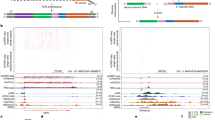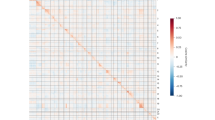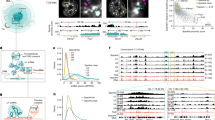Abstract
DNA sequences of the X-chromosome-linked hypoxanthine phos-phoribosyltransferase (HPRT) and glucose 6-phosphate dehydrogenase (G6PD) genes have revealed the presence of clusters of CpG dinucleotides1–3, raising the possibility that such clusters are involved in the control of expression of these genes, which are expressed in all tissues. Although CpG clusters are not exclusive features of the X chromosome4–6, the analysis of X-linked genes provides the means to determine whether CpG clusters are control elements; one of the two homologous X loci in female mammals is not expressed7, so that active and inactive versions of the gene can be compared. In fact, it has been shown that these CpG clusters are undermethylated when the gene is active and extensively methylated when the gene is inactive2,8. In addition to hypomethylation, chromatin hypersensitivity to endonuclease digestion is a known hallmark of regulatory sequences in eukaryotic genes9. We report here that the CpG clusters of the active hprt and g6pd genes are not only undermethylated, but also hypersensitive to MspI, DNase I and S1 nuclease, further supporting the suggestion that they are involved in the control of expression of these genes.
This is a preview of subscription content, access via your institution
Access options
Subscribe to this journal
Receive 51 print issues and online access
$199.00 per year
only $3.90 per issue
Buy this article
- Purchase on Springer Link
- Instant access to full article PDF
Prices may be subject to local taxes which are calculated during checkout
Similar content being viewed by others
References
Jolly, D. J., Esty, A. C., Bernard, H. U. & Friedmann, T. Proc. natn. Acad. Sci. U.S.A. 79, 5038–5041 (1982).
Wolf, S. F., Jolly, D. J., Lunnen, K. D., Friedmann, T. & Migeon, B. B. Proc. natn. Acad. Sci. U.S.A. 81, 2806–2810 (1984).
Toniolo, D. et al. EMBO J. 3, 1987–1995 (1984).
Stein, R., Sciaky-Gallili, N., Razin, A. & Cedar, H. Proc. natn. Acad. Sci. U.S.A. 80,4035–4039 (1983).
Chen, M.-J. et al. J. biol. Chem. 59, 3935–3943 (19XX).
Siebenlist, U., Hennighausen, L., Battey, J. & Leder, P. Cell 37, 381–391 (1984).
Lyon, M. F. Biol. Rev. 47, 1–35 (1974).
Wolf, S. F. et al. Nucleic Acids Res. 12 (24) 9333–9348 (1984).
Weisbrod, S. Nature 297, 289–295 (1982).
Dingwall, C., Lomonossoff, G. P. & Laskey, R. A. Nucleic Acids Res. 9, 2659–2673 (1981).
Emerson, B. S. & Felsenfeld, G. Proc. natn. Acad. Sci. U.S.A. 81, 95–99 (1984).
Jongstra, J. et al. Nature 307, 708–714 (1984).
Schubach, W. & Groudine, M. Nature 307, 702–708 (1984).
Melton, D. W., Konecki, D. S., Brennand, J. & Caskey, C. T. Proc. natn. Acad. Sci. U.S.A. 81, 2147–2151 (1984).
Author information
Authors and Affiliations
Rights and permissions
About this article
Cite this article
Wolf, S., Migeon, B. Clusters of CpG dinucleotides implicated by nuclease hypersensitivity as control elements of housekeeping genes. Nature 314, 467–469 (1985). https://doi.org/10.1038/314467a0
Received:
Accepted:
Published:
Issue Date:
DOI: https://doi.org/10.1038/314467a0
This article is cited by
-
Silent remembrance
Nature Reviews Molecular Cell Biology (2005)
-
DNA methylation of the fragile X locus in somatic and germ cells during fetal development: Relevance to the fragile X syndrome and X inactivation
Somatic Cell and Molecular Genetics (1993)
-
The distribution of genes on chromosomes: A cytological approach
Journal of Molecular Evolution (1993)
-
Evolution of the primate ?-Globin gene region: Nucleotide sequence of the ?-?-globin Intergenic region of gorilla and phylogenetic relationships between African Apes and Man
Journal of Molecular Evolution (1992)
-
HpaII library indicates ‘methylation-free islands’ in wheat and barley
Theoretical and Applied Genetics (1992)
Comments
By submitting a comment you agree to abide by our Terms and Community Guidelines. If you find something abusive or that does not comply with our terms or guidelines please flag it as inappropriate.



